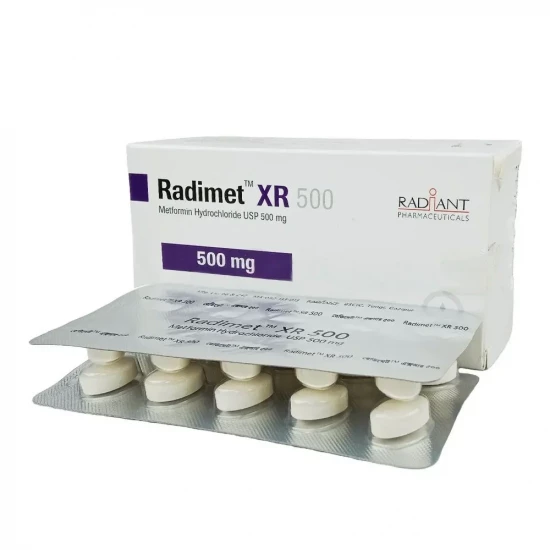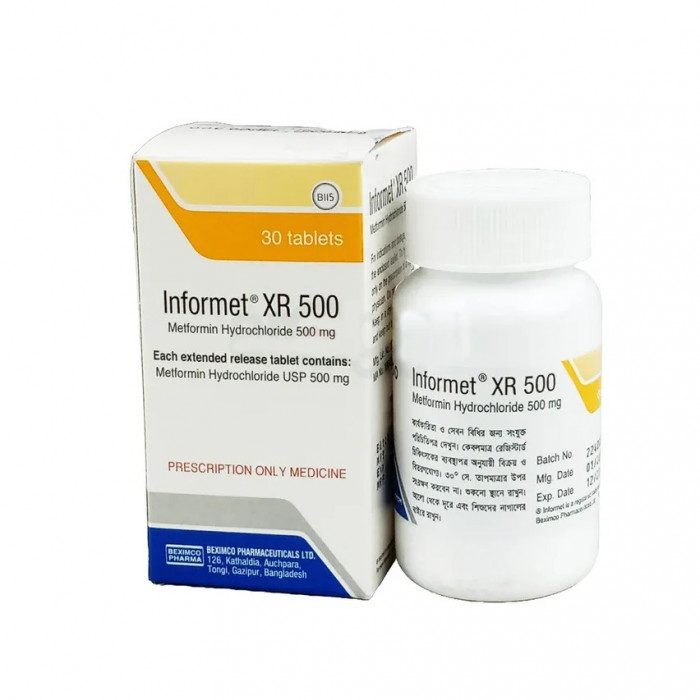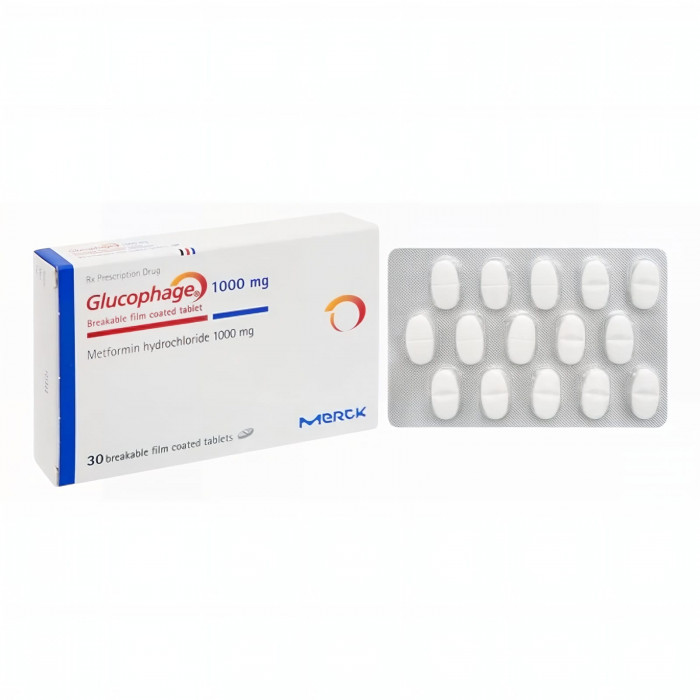
✔ 100% Authentic Product
👁️ Currently Viewing 462
Formet is indicated for the management of type 2 diabetes mellitus, particularly in overweight patients when diet and exercise alone fail to provide adequate glycaemic control.
- Adults: May be used as monotherapy or in combination with other oral antidiabetic agents or insulin.
- Children (≥10 years) and adolescents: May be used alone or together with insulin.
Elderly: Start with lower doses and monitor renal function regularly.
Children (10–12 years): Use with caution; monitor growth and puberty during therapy.
Clinical studies have shown that metformin, as first-line therapy in overweight type 2 diabetic patients, helps reduce the risk of diabetic complications.
Discount
Price: ৳ 59
MRP:
৳
60
2%
Off

100% Genuine Products, Guaranteed

Safe & Secure Payments, Always

Fast, Secure & Efficient Delivery

Proper Packaging
 Cash on Delivery - All over Bangladesh
Cash on Delivery - All over Bangladesh Regular Delivery - 12-24 Hours, Dhaka City* Charge Tk.39-59
Regular Delivery - 12-24 Hours, Dhaka City* Charge Tk.39-59 Regular Delivery - 24-48 Hours, Other Cities* Charge Tk.99-110
Regular Delivery - 24-48 Hours, Other Cities* Charge Tk.99-110
🌙 রমযান অফার 🌙
 ফ্রি ডেলিভারিঃ - ৭৯৯ টাকা+ অর্ডারে, ঢাকা
শহরে
ফ্রি ডেলিভারিঃ - ৭৯৯ টাকা+ অর্ডারে, ঢাকা
শহরে ফ্রি ডেলিভারিঃ - ২৭৯৯ টাকা+ অর্ডারে, ঢাকার
বাহিরে
ফ্রি ডেলিভারিঃ - ২৭৯৯ টাকা+ অর্ডারে, ঢাকার
বাহিরে
📲 মোবাইল অ্যাপ অর্ডারে সাশ্রয় বেশী
-
Google Play Store থেকে ডাউনলোড
-
Apple Store থেকে ডাউনলোড
100% Genuine Products, Guaranteed
Safe & Secure Payments, Always
Fast, Secure & Efficient Delivery
Proper Packaging
 Cash on Delivery - All over Bangladesh
Cash on Delivery - All over Bangladesh Regular Delivery - 12-24 Hours, Dhaka City* Charge Tk.39-59
Regular Delivery - 12-24 Hours, Dhaka City* Charge Tk.39-59 Regular Delivery - 24-48 Hours, Other Cities* Charge Tk.99-110
Regular Delivery - 24-48 Hours, Other Cities* Charge Tk.99-110 ফ্রি ডেলিভারিঃ - ৭৯৯ টাকা+ অর্ডারে, ঢাকা
শহরে
ফ্রি ডেলিভারিঃ - ৭৯৯ টাকা+ অর্ডারে, ঢাকা
শহরে ফ্রি ডেলিভারিঃ - ২৭৯৯ টাকা+ অর্ডারে, ঢাকার
বাহিরে
ফ্রি ডেলিভারিঃ - ২৭৯৯ টাকা+ অর্ডারে, ঢাকার
বাহিরে- Google Play Store থেকে ডাউনলোড
- Apple Store থেকে ডাউনলোড
🌙 রমযান অফার 🌙
📲 মোবাইল অ্যাপ অর্ডারে সাশ্রয় বেশী
✅ Description:
Metformin is a biguanide that lowers both fasting and postprandial blood glucose levels without causing hypoglycemia. Its mechanism of action includes:
- Inhibition of hepatic glucose production (gluconeogenesis)
- Reduction in intestinal glucose absorption
- Enhancement of insulin sensitivity and peripheral glucose uptake
✔️ Formet 850 acts by:
- Decreasing hepatic glucose output.
- Delaying intestinal absorption of glucose.
- Improving insulin sensitivity in muscle and fat tissue.
✔️ Dosage & Administration-Immediate-Extended-Release TabletsRelease Tablets
Adults:
Initial dose: 500 mg twice daily or 850 mg once daily with meals.
Dose may be increased gradually by 500 mg weekly or 850 mg every 2 weeks up to 2000–2550 mg/day, given in divided doses.
Doses above 2000 mg are better tolerated when taken three times daily with meals.
Children (≥10 years):
Starting dose: 500 mg twice daily with meals.
Increase by 500 mg weekly, up to a maximum of 2000 mg/day in divided doses.
✔️ Dosage & Administration:
Adults:
Starting dose: 500 mg once daily with the evening meal.
Increase by 500 mg weekly up to a maximum of 2000 mg once daily, or 1000 mg twice daily with meals.
Do not crush or chew extended-release tablets.
Renal Impairment:
Contraindicated if eGFR <30 mL/min/1.73m².
Reassess benefits and risks if eGFR <45 mL/min/1.73m².
✔️ Side Effects
Common: Nausea, vomiting, diarrhea, abdominal pain, loss of appetite, metallic taste.
Very Rare: Lactic acidosis, reduced vitamin B₁₂ absorption, skin rash, or liver function abnormalities.
Long-term use may cause vitamin B₁₂ deficiency, potentially leading to anemia or neuropathy.
✔️ Pregnancy & Lactation
Pregnancy: Metformin should be avoided during pregnancy; insulin is preferred for optimal glycaemic control.
Lactation: Small amounts of metformin are excreted in breast milk. Use is not recommended during breastfeeding.
✔️ Interaction
- Nifedipine: May enhance metformin absorption.
- Cationic drugs (e.g. Digoxin, Morphine, Quinidine) may compete for renal tubular secretion.
- Thiazide diuretics, corticosteroids, estrogen, oral contraceptives, phenytoin, nicotinic acid, calcium channel blockers, and isoniazid may reduce glycaemic control.
- Alcohol and NSAIDs increase the risk of lactic acidosis.
✔️ Contraindications
- Hypersensitivity to metformin.
- Severe renal impairment (GFR <30 mL/min).
- Metabolic acidosis (including lactic acidosis, diabetic ketoacidosis).
- Conditions associated with hypoxia (e.g. cardiac or respiratory failure, shock, recent MI).
- Hepatic impairment or excessive alcohol intake.
✔️ Precautions & Warnings
- Monitor renal function regularly; discontinue if kidney function deteriorates.
- Stop therapy temporarily before surgery or radiologic procedures involving contrast dye.
- Use with caution in elderly patients due to decreased renal clearance.
- Monitor vitamin B₁₂ levels annually during long-term use.
- Avoid in conditions causing dehydration, infection, or shock.
- May cause lactic acidosis—a rare but serious condition; discontinue if symptoms like rapid breathing, fatigue, or abdominal pain occur.
✔️ Storage:
- Store below 30°C, away from moisture and direct light.
- Keep out of reach of children.
- Dispense only on prescription of a registered physician.
⚠️Disclaimer:
At ePharma, we’re committed to providing accurate and accessible health information. However, all content is intended for informational purposes only and should not replace medical advice from a qualified physician. Please consult your healthcare provider for personalized guidance. We aim to support, not substitute, the doctor-patient relationship.


























